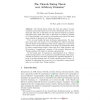Free Online Productivity Tools
i2Speak
i2Symbol
i2OCR
iTex2Img
iWeb2Print
iWeb2Shot
i2Type
iPdf2Split
iPdf2Merge
i2Bopomofo
i2Arabic
i2Style
i2Image
i2PDF
iLatex2Rtf
Sci2ools
135
click to vote
BIRTHDAY
2008
Springer
2008
Springer
The Church-Turing Thesis over Arbitrary Domains
The Church-Turing Thesis has been the subject of many variations and interpretations over the years. Specifically, there are versions that refer only to functions over the natural numbers (as Church and Kleene did), while others refer to functions over arbitrary domains (as Turing intended). Our purpose is to formalize and analyze the thesis when referring to functions over arbitrary domains. First, we must handle the issue of domain representation. We show that, prima facie, the thesis is not well defined for arbitrary domains, since the choice of representation of the domain might have a non-trivial influence. We overcome this problem in two steps: (1) phrasing the thesis for entire computational models, rather than for a single function; and (2) proving a "completeness" property of the recursive functions and Turing machines with respect to domain representations. In the second part, we propose an axiomatization of an "effective model of computation" over an arbi...
| Added | 12 Oct 2010 |
| Updated | 12 Oct 2010 |
| Type | Conference |
| Year | 2008 |
| Where | BIRTHDAY |
| Authors | Udi Boker, Nachum Dershowitz |
Comments (0)

